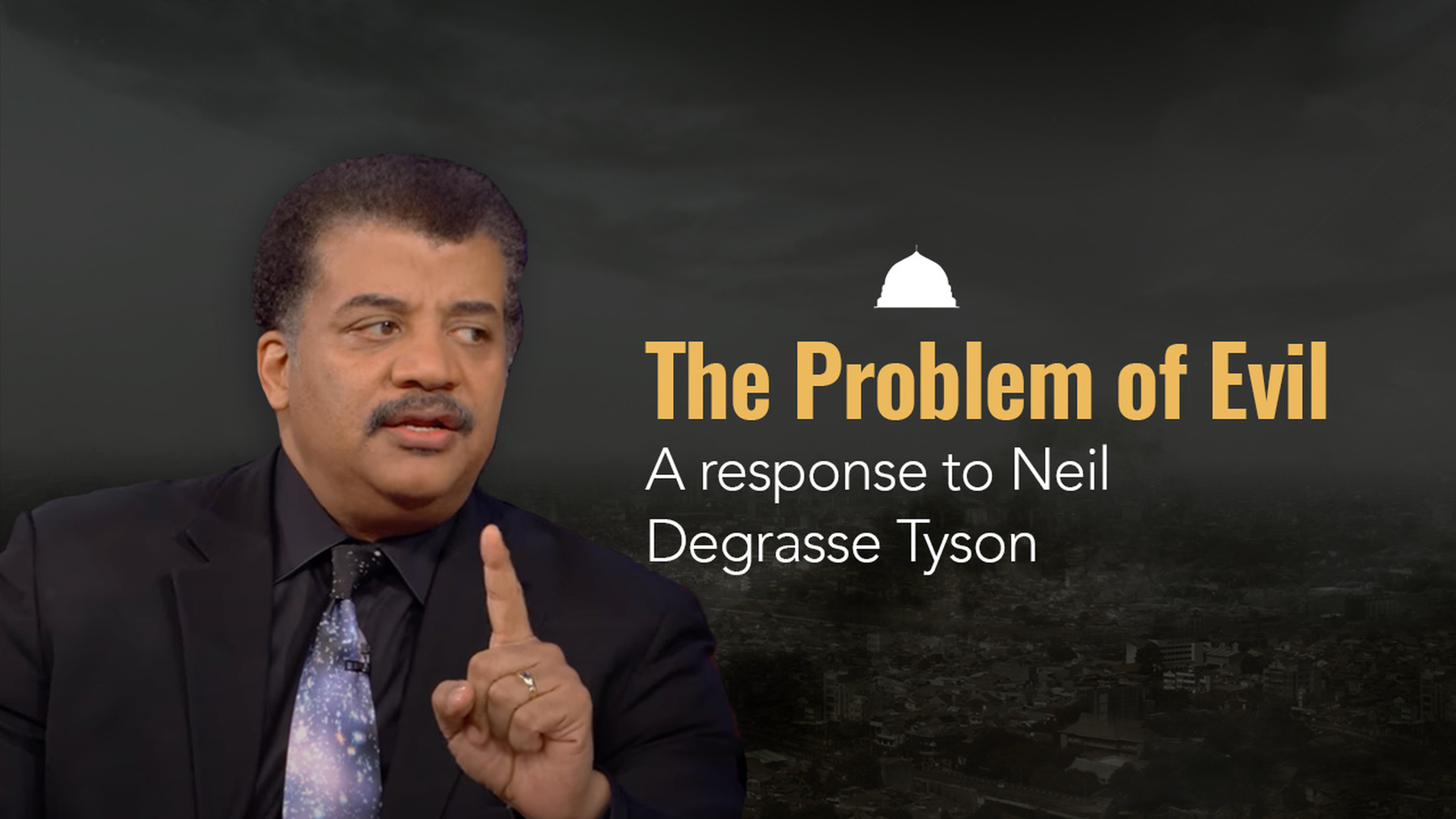The Problem of Evil

Astrophysicist Neil deGrasse Tyson denies God’s existence on the basis of evil and suffering in the world. He argues that he is evidence driven and not faith driven.
See full video of Neil deGrasse Tyson's response on if he believes in God: Click Here
God, Science and Evidence
It is a fact that the majority of scientists believe in God. Tyson admits that two-thirds of scientists pray to a personal God. This is no surprise. Why would it be? The natural laws that govern the universe are mind-numbing in their complexity and precision. They could only have been designed by a perfect and powerful Designer.
An infinitesimal change in any of the constants and forces in nature – the forces of gravity and electromagnetism, for example, or the size of the electric charge of the electron and the ratio of the masses of the proton – would cause all life to cease to exist.
The fine-tuning of the universe is one of the most powerful proofs of God’s existence. If you are a scientist, ‘evidence-based’ and rational, the conclusion is inescapable. As is the conclusion that the universe did not have to exist. It is contingent and must have a cause that is Necessary.
God, Evil and Human Suffering
Tyson’s second argument is that the existence of suffering and evil precludes God’s existence. But how strong is his argument? As it turns out, it’s very weak. Here’s why.
If we map out his argument it looks like this:
If God is All-Good and All-Powerful, there would not be suffering in the world.
There is suffering in the world.
Therefore, God does not exist.
But if we look at the first premise – that if God is All-Good and All-Powerful, there would not be suffering in the world – there is no necessary logical contradiction between God being All-Good and All-Powerful and suffering in the world. Why?
First, because if God chose to create a world of free will – in which you and I make free choices – God, who is All-Just, would allow evil and suffering in the world due to our choices. If God created human beings and negated all evil, he would have negated their choice. How fair is that? How could God hold us responsible without any authentic choice? We may as well just be angels walking the face of the earth.
Second, God is All-Wise. He may choose to allow suffering to exist because of certain wisdoms and benefits. Is all suffering pointless, without any benefit to anyone? That is, does God allow suffering merely for the sake of suffering? No. Suffering – tests and trials – have their wisdoms: for example, the expressions of patience, caring, empathy, compassion, service and sacrifice that suffering elicits.
Third, as mentioned above, God is All-Just. Else, He would not be God. Tyson’s definition of God is incomplete and partial (and is loaded, and perhaps even sets up a straw-man argument). God’s justice demands that evil and suffering will be accounted for and recompensed according to a scale of perfect equity and fairness. In Islam, belief in the Afterlife and Day of Judgement is an article of faith and a necessary consequence of believing in God.
Evil and suffering do not have the last word in the world for the Muslim. But for a materialist like Tyson, imprisoned as he is within the dense reality of matter, there is no other world or other reality. His picture of existence (and his definition of God) is therefore incomplete – like an equation that misses a key variable. Such an equation or formula cannot be truly balanced or accurate.
The Full Picture
For the Muslim, there are no contractions. God is All-Just, All-Wise, All-Loving. There is wisdom, grace, the expression of virtue, and spiritual growth in calamity. Any unfairness in the world is resolved in the Hereafter through the absolute Divine scale of Justice.
Our scholar-saints, possessed of penetrating intellects and transparent souls, were able to see deeper than the mere material, and thus harmonize what others were unable to observe, discern or comprehend.
Reflect, for example, on what Shaykh Ibn Ata’illah (rahimahu Allah) expressed on some of the secrets of suffering and evil in the world:
إنَّما أجْرى الأذى عَلى أيْديهِمْ كَيْ لا تَكونَ ساكنِاً إلَيْهِمْ. أرادَ أنْ يُزْعِجَكَ عَنْ كُلِّ شَيْءٍ حَتى لا يَشْغَلَكَ عَنْهُ شَيْءٌ
He only made harm affect you from their hands so that you would not find rest in them. He wants to make you uncomfortable from inclining toward anything, so that nothing distracts you from Him.
In this lies incomparable meaning, solace and strength for all those afflicted by suffering and evil: That this world – no matter what it holds of finite suffering and evil – is nothing compared to the infinity to come, and to God’s Infinitely Loving and Just recompense of the Hereafter.
And more: that patience, fortitude and sacrifice – among other values of dealing with evil and suffering with nobility and dignity – is the path to a transcendent experiential knowledge of God’s Infinite Beauty and Majesty, here and now.
اللَّهُمَّ أَرِنِي الْحَقَّ حَقًّا وَوَفِّقْنِي لِاتِّبَاعِهِ وَأَرِنِي الْبَاطِلَ بَاطِلًا وَوَفِّقْنِي لِاجْتِنَابِهِ
A Prophetic tradition teaches us that the world relates to us as we relate to God. Those who are dismissive and denigrative of God inherit a world accordingly: brutish, heartless and meaningless.
O Allah, show me the truth as truth and grant me the strength to follow it. And show me falsehood as falsehood, can grant me the strength to avoid it.